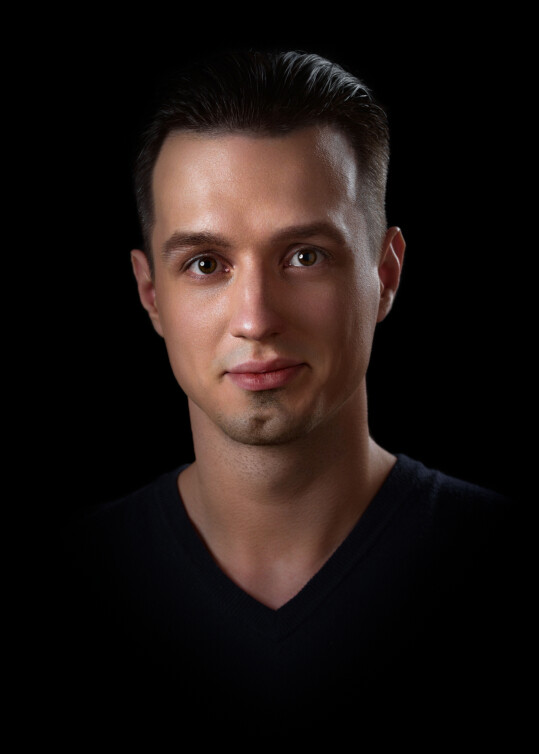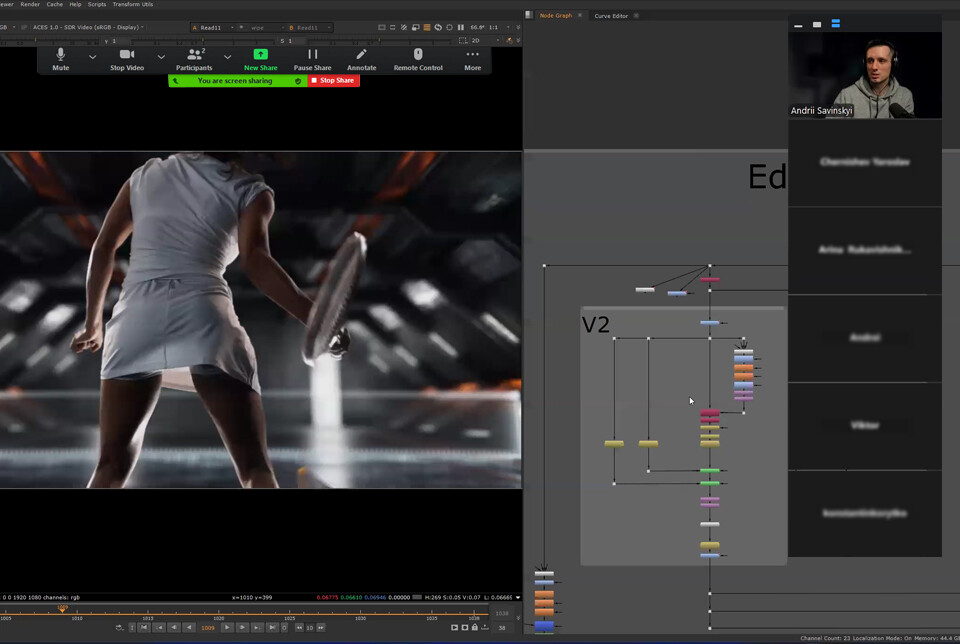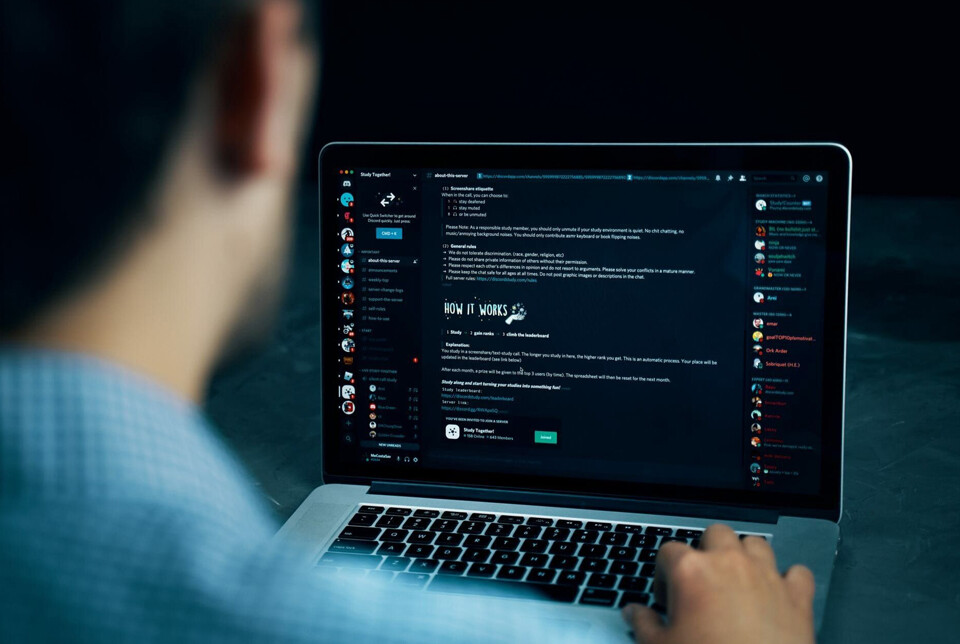 NUKE: Keying
NUKE: Keying
Master the art of keying in 8 weeks with live interactive sessions and real-world examples.
Course Start
Nov 22, 2025
10 PLACES
IN THE GROUP
LIVE-CLASSES
Master Keying in NUKE: Learn VFX Techniques
Unlock the power of professional keying in NUKE with a hands-on, interactive 8-week course. This course goes beyond simply understanding the tools—it focuses on teaching you how to think like a VFX artist, breaking down complex shots and mastering the art of keying used in top Hollywood studios.
Through live, interactive lessons, you'll gain a deep understanding of NUKE’s keying tools and techniques, while developing the problem-solving skills necessary to handle any shot independently. Each week, you'll work on new challenges designed to mirror real-world VFX projects, receive personalized feedback during dailies, and refine your approach until you achieve a professional-level result.
You’ll leave the course not only with a completed showreel showcasing your keying expertise, but also with the confidence to apply these skills in real-world VFX workflows. Whether you’re an aspiring compositor or looking to level up your skills, this course will give you the tools to key like a pro.
Only 10 spots available. Secure yours now!
Meet Your Instructor
A Certified NUKE Trainer and a Senior Artist
Andrew Savinskiy
With over 10 years of VFX experience, I’ve worked on some of the biggest films, including Avengers: Endgame, Avengers: Infinity War and Mufasa: The Lion King. I’ve also had the privilege of working for some of the largest VFX studios in the world, including Framestore and MPC. Since 2016, I’ve focused on teaching, helping students not just learn NUKE, but master the practical skills needed for professional VFX work.
I keep my groups small—no more than 10 students—to provide personalized attention. My courses emphasize hands-on learning with live sessions and detailed feedback during dailies. You’ll learn to think like a VFX artist, solving complex compositing challenges independently.
I understand the struggles of learning compositing alone, which is why I focus on making the process clearer and more effective for my students. Whether you're new to NUKE or sharpening your skills, my courses will equip you with the tools and mindset to succeed in any VFX studio.

What You’ll Gain from the Course
In-Depth Understanding of Keying
You’ll learn to analyze a shot, break it down into manageable parts, and follow a step-by-step approach to keying. Through mastering the most effective tools and techniques, you’ll gain practical experience handling real-world VFX shots, ensuring you can tackle any keying challenge independently.
Hands-On Practice with 12 Shots
You’ll work on 12 shots, with 8 required for completion. Each shot reflects real tasks faced in professional VFX work, allowing you to build a strong portfolio. You'll also have access to my scripts after completing your own, giving you a chance to compare approaches and refine your skills for future projects.
Live Sessions and Personalized Feedback
Throughout the course, you’ll benefit from live online classes and regular dailies where your work will be reviewed in detail. This ensures that you’ll receive prompt, constructive feedback to improve both your technical and creative skills, with all your questions addressed in real time.
Industry-Level Keying Skills
By the end of the course, you’ll have mastered the keying process used in top studios. You’ll be able to break down a shot into core, edges, and garbage areas, handle transparency and despill with precision, and confidently approach any complex keying task with a clear, structured workflow.
This course is designed for
Basic Nuke Users
This course is designed for those who already have some experience in Nuke and understand the basics of the software. Whether you’ve worked on a couple of shots or come from a cleanup background, a solid foundation in Nuke is essential to progress through the course.
Compers Refining Skills
Whether you're learning Nuke, seeking to enhance your keying techniques, or want to structure your existing knowledge, this course offers an opportunity to master keying. The skills you’ll gain are highly valuable across film, TV series, and advertising.
Aspiring Compositors
Cleanup artists often see keying as the next step in their career progression. If you’ve already covered the basics of Nuke, this course provides the in-depth focus on keying that will take your compositing skills to the next level.
Future VFX Artists
For those not yet ready for full-time studio work but eager to master essential VFX skills, this course offers hands-on practice with real-world scenarios. You’ll also experience dailies and feedback sessions, mimicking the process used in professional studios.
Course Format
Weekly Structure
The course is built around a structured weekly schedule.
Each week starts with a lecture on Saturday, where theoretical concepts are introduced, practical assignments are discussed, and questions from students are answered. The length of the session depends on student engagement, typically ranging from 1 to 3 hours, with the class ending only when all questions are resolved.


On Mondays, we hold a daily session where I review student scripts and provide detailed feedback. This session also varies in length depending on the complexity of the work, and can last from 1 to 3 hours.
On Thursdays, we meet for a final review of the week’s work, where I again evaluate scripts and answer any remaining questions.
Live Feedback and Chat Support
To ensure students are well-supported, we have a Discord group where you can ask questions anytime.
Live feedback sessions are held via Zoom, where I review your scripts in detail, providing hands-on guidance and correction.
Sessions are recorded and made available for download after class.


Practical Approach
This course is designed to reflect real studio work.
Each week, you'll be tasked with completing a specific shot, with all necessary materials and detailed instructions provided.
After completing your work, you'll submit your script for review, where I’ll evaluate the thought process, logic, and technical execution of your node tree.
Deadlines and Discipline
One shot per week must be completed on time.
Each week, you’ll have 8 mandatory shots, with an additional choice between two shots in certain weeks. Timely submission of work is essential, simulating real-world studio conditions.
This course is intense and requires commitment—I'm here to help those who are serious about learning and progressing.

Student Showreel
Course Curriculum
What We Will Do in the First Month
We will focus on theory, but the shots we work on will still be the kind we regularly encounter in professional work. Starting from the first session, we will methodically discuss all essential topics and explore all necessary techniques. We’ll gradually progress — from simpler tasks to more complex ones. Over the course of the month, we will cover all the theory needed and apply it to relatively straightforward shots.
Week 1
Luma Key. Working with One Channel.
We will break the image into areas and adjust them individually. Core, edges, and garbage areas will be separated. We’ll apply the "Frankenstein" approach by splitting the image and handling it in parts. Other topics include dealing with camera artifacts, creating a clean plate, extracting semi-transparencies, and using the "divide-multiply" algorithm.
Week 2
Green Screen Keying.Working with Multiple Channels.
We’ll use IBKGizmo as a versatile tool to extract semi-transparencies on green and blue screens. Special attention will be given to preserving reflections on a phone screen.
Week 3
Further Work with Multiple Channels.
We’ll dive deeper into the creation of alpha channels with IBKGizmo. Topics include despill algorithms, procedural creation of masks for "Frankenstein" techniques, and studying the parameters of the IBKGizmo node. We’ll also review Nuke's standard keying tools and apply them to keying a blue screen.
Week 4
Integrating the Keyed Image into a New Background.
We'll focus on matching the background and plate, and practice working on a more complex shot.
What We Will Do in the Second Month
With all the necessary theory covered, we will now focus on applying that knowledge to more complex and typical tasks. The second month will be all about practicing and mastering keying on more challenging shots.
Week 5
Keying a Dark Shot and Preserving Details on Edges.
We’ll work on a shot that involves keying a character with intricate edge details and preserving color variations. You’ll also create and enhance the background, featuring city lights from the top of a skyscraper. We’ll key a glass with liquid, paying attention to fine transparency details.
Week 6
Keying a Train Operator’s Cabin.
Here, the focus will be on preserving reflections in the glass, recreating problematic edges, and integrating a new background behind the glass.
Week 7
Keying a Character Getting Into a Car.
We’ll replace a blue screen with a dynamic background created from static images. Special attention will be given to cleaning up edges and maintaining fine detail in all borders.
Week 8
Final Shot: Subway Train Integration.
We’ll integrate a keyed subway cabin into a rendered subway tunnel. This includes despill, color correction to guide viewer attention, and matching the CG elements with the plate.
Why This Course?
Focus on Teaching and Student Support
Teaching is my primary profession, and I’m fully dedicated to supporting and helping students succeed. This course isn’t a “set-it-and-forget-it” situation – I’m actively engaged in explaining every part of the keying process, giving detailed feedback, and making sure students not only understand how to key a specific shot but develop the skills to tackle any keying challenge in the future.
Real-World Experience from Major Projects
My experience working on high-profile projects like Avengers: Endgame and Mufasa: The Lion King has shaped the theory I teach. I’ve streamlined the curriculum to focus on what really matters, cutting out unnecessary information and focusing on practical, impactful skills. My feedback is based on what top-tier supervisors and clients expect, helping students refine their technical skills and creative instincts.
Problem-Solving Over Step-by-Step Solutions
Instead of giving you a ready-made solution, I provide all the tools and information you need to solve the shot on your own. Think of it as a puzzle where you have to figure out how to piece everything together. Only after you’ve tried will I show my solution and breakdown – this way, you’ll build strong problem-solving skills rather than just following pre-built answers.
Small Group, Big Learning Opportunities
With a maximum of 10 students, everyone gets enough individual attention, allowing for in-depth feedback. At the same time, you’ll learn from seeing how others approach the same task. The smaller class size ensures personalized guidance, but still offers diverse examples of how your peers handle similar challenges.
Payment and Progress Conditions
Registration for the course will open in October
FAQ
Comments, Questions and Testimonials









авторизуйтесь
I am interested in your courses. So glad I bumped into you on You Tube. Do you sell the recordings of the courses at a discount? In other words, just the recordings minus the live session and feedback. I don't really need live sessions. I mean I am definitely considering live sessions. But I am just asking. Also, you haven't posted a price yet for the Nuke Keying course. It looks like you charge 500 pounds for the Russian version of the Nuke Keying course but I don't see prices for the English version. I'm guessing its the same?
Thanks for your comment and your question.
Unfortunately, I didn't find enough interest from others in my course. It means, financially I won’t be able to handle this activity.
I didn’t plan to make a prerecorded videos. The whole idea is based on “real life” communication and problem solving. The most important is a student activity with a shot. That is why I planned to spend a lot of time around script checking and answering the questions based on the work to be done.
If you are interested only in theory, I have recorded all the course theory and uploaded it on youtube. It’s in Russian, but I guess nowadays it won’t be a problem to use a decent AI to translate it to English =)
https://www.youtube.com/watch?v=avmW4wUd1zo&list=PL31SALgEwnPotQFNoSp0wV40OxGUgxweC